This post may contain affiliate links. Please read our disclosure policy.
Healthy gluten free oatmeal pancakes made with whole grain gluten free oats help you start your day with a high fiber breakfast.

Table of Contents
- The best gluten free oatmeal pancakes recipe
- Gluten free oatmeal pancake ingredients
- Tips for making oat gluten free pancakes
- Storing leftover gluten free oat pancakes
- Gluten free oatmeal pancakes: substitutions
- FAQs
- Gluten Free Oatmeal Pancakes, recipe below
- Gluten Free Oatmeal Pancakes Recipe | Fluffy and Filling
The best gluten free oatmeal pancakes recipe
I don't know about you, but I'm not planning to wake up early enough to make gluten free pancakes from scratch on a school morning for my kids. I may be unnaturally obsessed with their eating a good breakfast on a school day, but I have my limits.
These healthy gluten free pancakes are meant to be made on a weekend, or (better yet) made ahead of time, wrapped well and frozen. Then, on a school morning, just pop 'em in the toaster, serve up some fruit and breakfast is ready. Done!
There isn't a ton of gluten-free flour in these pancakes. And what there is, is xanthan-gum free since pancakes are better that way.
They are made of mostly roughly processed oats (in a blender or food processor). I tried making them with mostly whole oats, and let's just say … don't do that.
I used virgin coconut oil to keep them straight-up healthy, but they also work beautifully with an equal amount of unsalted butter, melted and cooled. They might even work with vegetable oil (but I haven't tried that so no promises).
They pass The 3-Kid Test—with flying colors. If there's higher praise, I don't know of it. Back-to-school here we come!

Gluten free oatmeal pancake ingredients
- Old-fashioned rolled oats – I use purity-protocol, certified gluten free rolled oats here, and process them roughly for a pancake that holds together but has the toothsome chew of oats. You can process your oats more fully into something closer to oat flour if you'd like a smoother pancake.
- Gluten-free flour blend – Here, I recommend either my 3-ingredient basic gum-free gluten free flour blend, or the same amount of superfine sweet white rice flour (also called glutinous rice flour, made from short grain white rice).
- Baking powder – Baking powder provides much of the lift in these pancakes as they cook.
- Baking soda – Baking soda reacts with the honey in this recipe to aid in the pancakes' rise, as well.
- Salt – Salt intensifies all the other flavors in these pancakes, and adds brightness.
- Coconut oil – Melted coconut oil is the only fat added here, and it helps tenderize the pancakes. In its place, you can use Spectrum brand nonhydrogenated vegetable shortening, or even melted butter if you don't need these pancakes to be dairy free. If you'd like to use virgin coconut oil but you don't like coconut flavor, try using triple-filtered coconut oil, which has no coconut flavor at all.
- Eggs – Eggs provide structured and lift in these pancakes. The egg yolks also add some richness.
- Honey – Honey adds sweetness, flavor, and helps to tenderize these pancakes.
- Milk – To keep these pancakes dairy free, use a nondairy milk alternative. Ripple brand nondairy milk is rich and flavorful, but unsweetened almond milk is always a great choice.
A word about gluten free oats
Whenever I share a recipe that uses oats on this gluten free recipe blog, there are always those readers who get very upset, insisting that oats may not be enjoyed on a gluten free diet. I've already discussed the issue that purity protocol oats are safely gluten free as they are grown and handled in strict gluten free settings. If you don't eat oats, you can always try a different gluten free pancake recipe or one of our oat substitutions.

Tips for making oat gluten free pancakes
Choosing the right type of oats
This recipe calls for roughly-processed gluten free rolled oats, which creates something closely resembling quick-cooking oats. Avoid using steel cut oats, even if you can find gluten free steel cut oats, since they're just too thick to be cooked this way. Your oats will end up raw, even after the pancakes are cooked.
Processing your gluten free oatmeal
I simply place old fashioned rolled oats in a blender or food processor and pulse a few times. Be sure you process your oats in small batches, so you don't end up with all oat flour, but rather a combination of some resembling a flour, but most rolled oats being chopped into smaller pieces.
How to achieve fluffy oatmeal pancakes
To ensure that you make fluffy oat pancakes, be sure to allow the pancake batter to sit at room temperature for at least 10 minutes before you cook it. That will allow the oats to absorb some of the liquid, softening the oats and creating a thicker batter that makes a pancake that has more depth to it. Just be sure to let the pancakes cook at medium-low heat long enough to cook all the way through.

Storing leftover gluten free oat pancakes
Leftover pancakes are a rare commodity in my house, since they can be wrapped tightly and enjoyed later. If you're lucky, you'll have a stack of 2 leftover oatmeal pancakes waiting for you on a busy morning.
Freezing gluten free oatmeal pancakes
Once tightly wrapped in freezer-safe wrap, ideally in stacks of 2 pancakes, store your pancakes in the freezer. They'll stay fresh in there for at least 2 months.
How to reheat oatmeal pancakes
If your pancakes were frozen, allow them to defrost in the refrigerator while still wrapped tightly so they don't dry out. You can also defrost them in the microwave. Sprinkle lightly with lukewarm water and reheat them in a warm toaster oven (about 300°F works great).

Gluten free oatmeal pancakes: substitutions
Dairy free, gluten free oatmeal pancakes
This recipe for oatmeal pancakes is already dairy free as written. Just be sure to use a nondairy milk that isn't fat free, as fat free milk doesn't add any richness and will make a batter that's quite runny.
Egg free, gluten free oatmeal pancakes
To replace the 2 eggs in this recipe, you can try 2 “chia eggs.” Combine 2 tablespoons ground white chia seeds and 2 tablespoons of lukewarm water in a small bowl, and allow the mixture to sit until it gels.
Vegan, gluten free oatmeal pancakes
If you follow the instructions for replacing the eggs in this recipe, the only non-vegan ingredient left is honey. In its place, you can try Lyle's Golden Syrup or light corn syrup. If you'd like to use pure maple syrup, you might have to reduce the nondairy milk in the recipe as maple syrup is thinner than honey.
Gluten free flour blend substitute
In place of the 3-ingredient gum-free gluten free flour blend I use for pancakes and other delicate recipes like this, you can use superfine sweet white rice flour (also called glutinous rice flour). You may be able to use superfine white rice flour, as well.
Making healthy banana oatmeal pancakes
These oatmeal pancakes without banana are different from many other oatmeal pancakes. We have a recipe for 4 ingredient banana pancakes, if you'd like a recipe that can be made with oat flour or almond flour. This recipe is banana-free, though!
Oatmeal gluten free pancakes mix-ins
If you'd like to dress up your oatmeal pancakes, try some of these flavorful additions:
- Add some miniature dairy free chocolate chips (Enjoy Life brand is great) to the raw pancake as it cooks on the underside
- Add diced fresh berries or other fresh fruit to the raw pancake as it cooks on the underside
- Try adding 1/2 teaspoon ground cinnamon to the raw batter, whisking in with the other dry ingredients
- Sprinkle some toasted coconut chips to the raw pancake as it cooks on the underside
FAQs
Are oats gluten free?
Purity protocol oats in the United States are, indeed, gluten free. Please see our discussion about gluten free oats for full information.
Are these oatmeal pancakes healthy?
I would consider these to be healthy gf pancakes, since they have relatively little fat, are sweetened with unrefined sugar, and have tons of whole grains. But you know how to balance your diet best!
What are the benefits of eating oatmeal pancakes?
These pancakes are super satisfying and hearty, so just a couple of pancakes makes for a great breakfast that will keep you going strong for hours.
Can I use store-bought gluten free quick oats for these gf oatmeal pancakes?
Yes, you can use store-bought gluten free quick-cooking oats in this recipe. Just be sure to measure them by weight, not volume.
How long can you store gluten free oat pancakes?
I avoid storing gluten free pancakes in the refrigerator, since it tends to be drying, but when wrapped tightly in small stacks, these completely cooked pancakes can be stored in the freezer for up to 2 months, if not longer.
Can I use this oatmeal pancake recipe to make banana oat pancakes?
You might be able to replace the honey in this recipe with an equal amount, by weight, of mashed banana, but I'm not sure it would work—and you should just use our recipe for banana oat pancakes instead!
Why are my gluten free oatmeal pancakes soggy?
If you allowed your raw pancake batter to sit and thicken before cooking your pancakes, your batter was probably quite thick. If your heat is too high, or simply don't cook the pancakes for long enough, your pancakes will brown deeply on the outside long before the inside is cooked all the way through, leading to soggy pancakes.
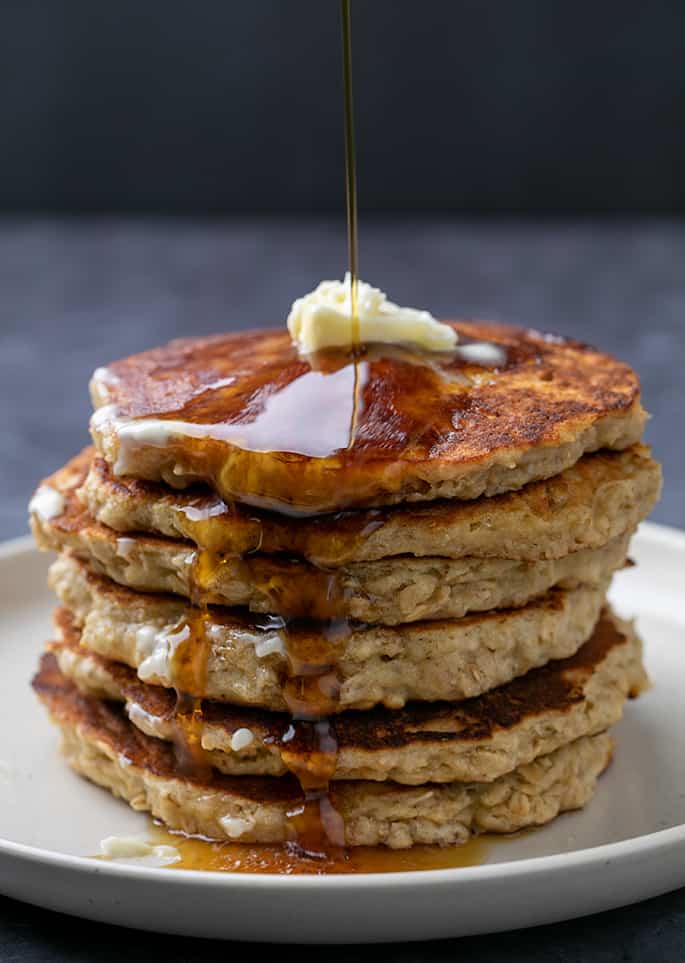
Gluten Free Oatmeal Pancakes, recipe below
Gluten Free Oatmeal Pancakes Recipe | Fluffy and Filling
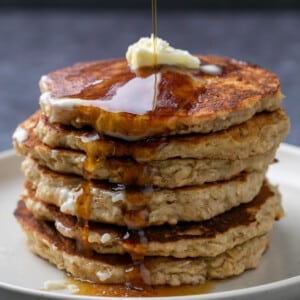
Ingredients
- 2 cups (200 g) certified gluten-free old-fashioned rolled oats, roughly processed (See Recipe Notes)
- ½ cup (70 g) basic gum free gluten free flour blend
- 2 teaspoons baking powder
- ¼ teaspoon baking soda
- ¼ teaspoon kosher salt
- 4 tablespoons (56 g) virgin coconut oil, melted and cooled (plus more for brushing the skillet)
- 2 (100 g (weighed out of shell)) eggs, at room temperature, beaten
- 3 tablespoons (63 g) honey
- 1 cup (8 fluid ounces) unsweetened nondairy milk, at room temperature
Instructions
- In a medium-sized bowl, place the roughly processed oats, the gf flour blend, baking powder, baking soda and salt, and whisk to combine well.
- Add the coconut oil, eggs, honey, and milk, and mix to combine fully. The batter will be pourable.
- Allow the batter to rest for at least 10 minutes at room temperature to allow the oats to absorb some of the liquid. This will make thicker, fluffier pancakes.
- Heat a large, heavy skillet over medium-low heat, and brush with a thin layer of virgin coconut oil. An electric skillet heated to about 325°F works great.
- Scoop the pancake batter into the hot skillet in 1/4-cup portions, and smooth and pat them out into rounds about 4 inches in diameter.
- Bubbles will begin to break through the surface of the pancakes from the underside.
- Once the pancakes are mostly set (about 1 minute), carefully flip them over and press down on the cooked side with a wide spatula to sear the other side.
- The thicker your pancakes are, the longer they will take to cook all the way through. Flip the pancakes back and forth if you like, to ensure that they cook all the way to the center.
- Remove the cooked pancakes from the skillet and place them on the prepared baking sheet and place the baking sheet in the preheated oven to stay warm until you have finished with all the pancake batter.
- Brush the skillet lightly with more coconut oil, and repeat with more pancakes.
- Serve pancakes warm.
Video
Notes
Nutrition information is automatically calculated, so should only be used as an approximation.
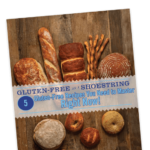
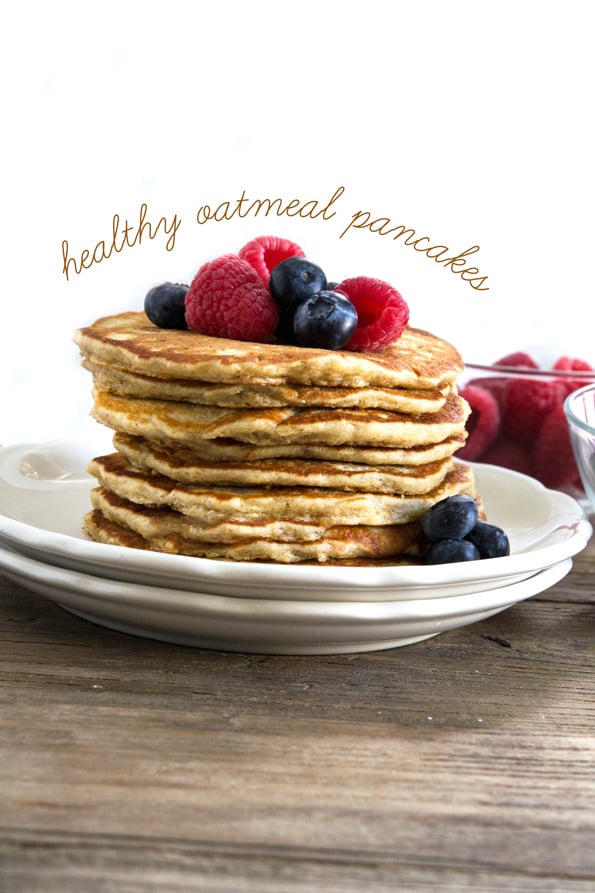

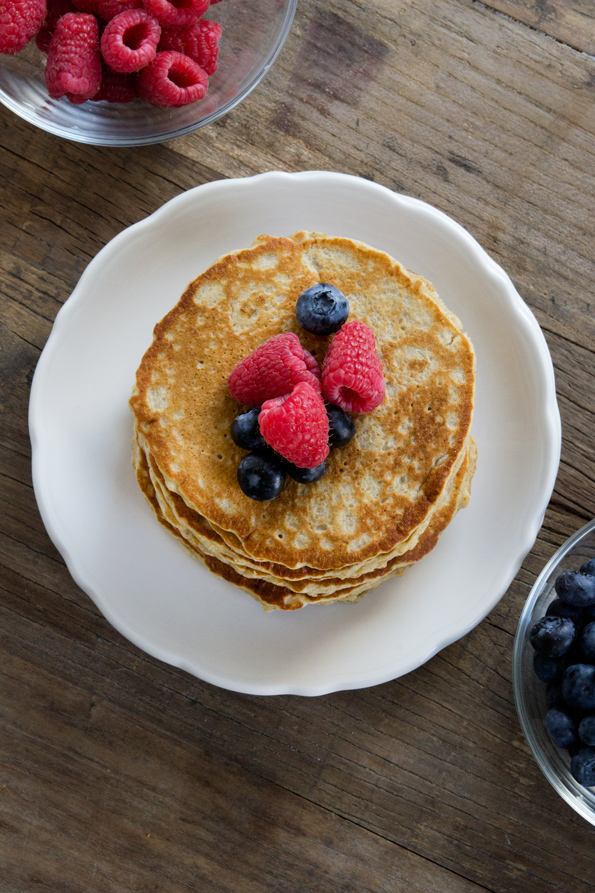
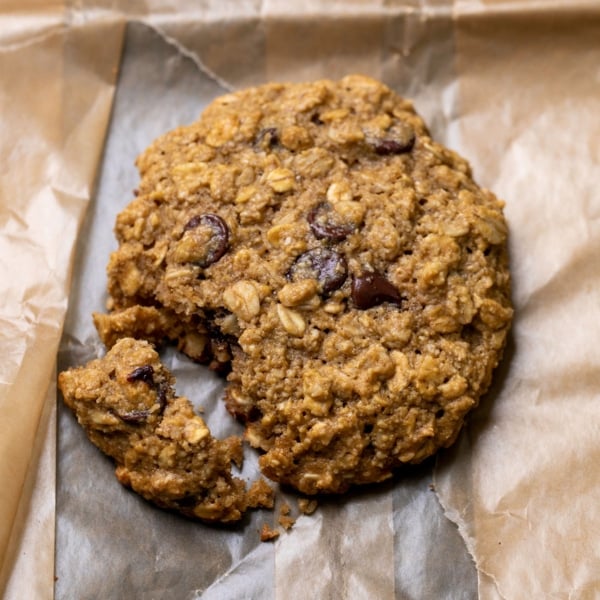
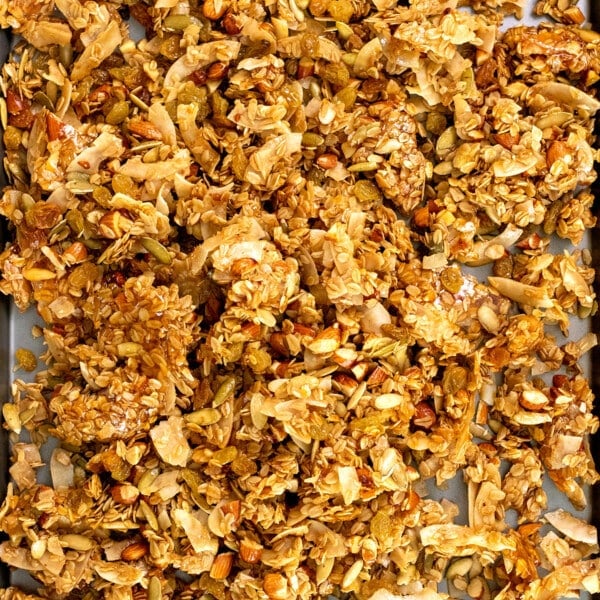
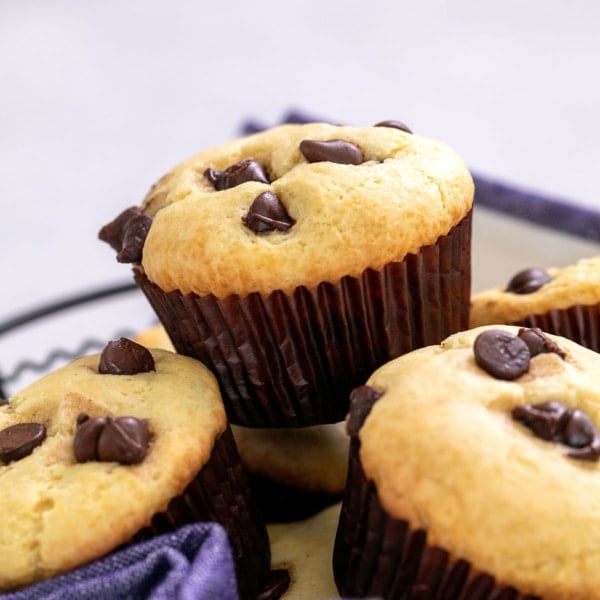
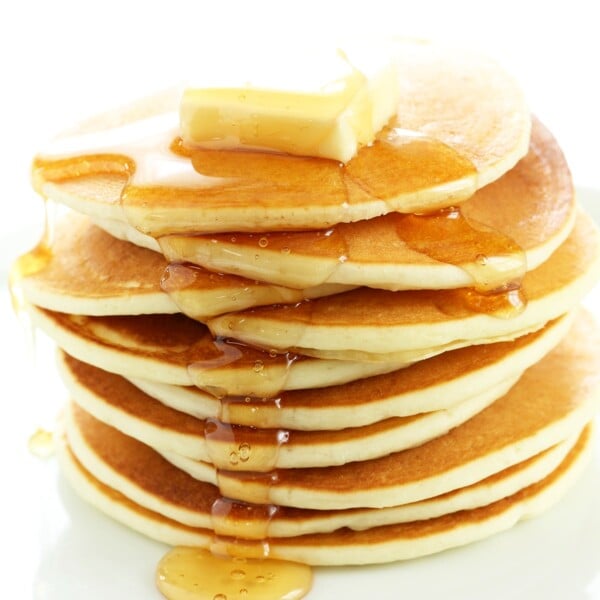









Wow! These are AMAZING! I added a dash of cinnamon to the dry ingredients. The key really is to let the batter to sit. The first three I made almost ran into one giant pancake and they were really hard to flip without breaking. They tasted delicious regardless. By the time I got around to frying the rest it was close to an hour later and the turned out like the picture. 😁. Now I have a question. Can quick cooking oatmeal be substituted for the rolled? And would I go by the weight of the rolled oats? I have both but more quick cooking ones and it would be one less step. Thanks for this amazing recipe.
Yes, you could definitely use quick cooking oats in place of the roughly processed rolled oats here, Nancy. And yes, definitely replace with an equal amount as measured only by weight.
Thanks for another wonderful recipe! My husband and I are not big pancake fans, but these were delicious! I saw your high protein pancake recipe, so I added collagen peptides to this recipe!
So glad you liked them, Teri!
Is there a similar recipe for Waffles?
Yes, I have a recipe for gluten free waffles. I’ve included a link. I don’t have a recipe for oatmeal waffles, though, no. You can always use the search function to find that recipe and any others you may want!